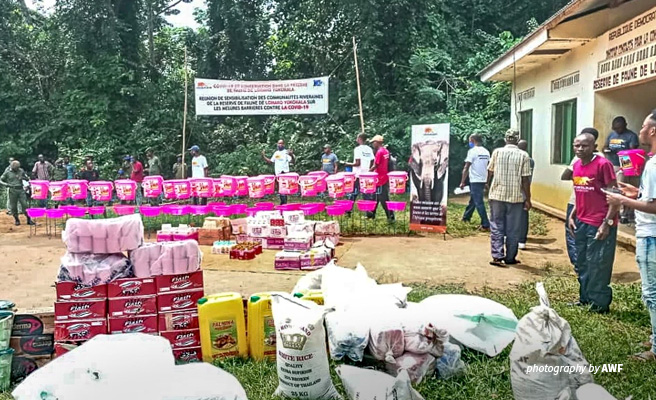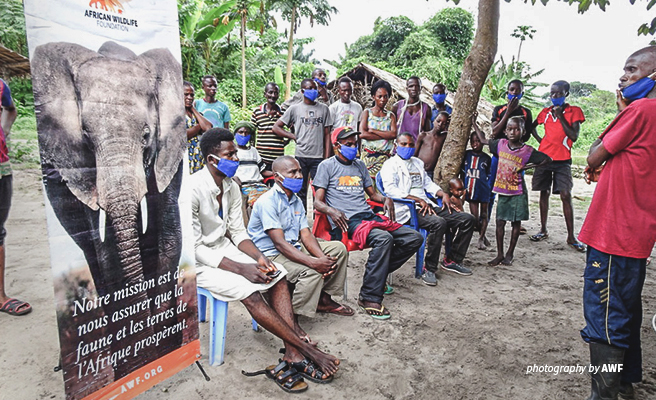Crossing forests and rivers to bring COVID-19 supplies to remote villages

Two months ago, I arrived in Kinshasa after a grueling four weeks deep inside the dense Congo Basin rainforest delivering critical materials so rural communities can protect themselves against the coronavirus disease.
It was an extraordinarily challenging journey, done primarily by motorcycle on hundreds of kilometers of forest trails barely wide enough for a man to walk, let alone a car to pass. In some places, the trails simply do not exist, covered up by thick undergrowth after months of disuse. So, in a way, we have to create our own paths, guided by intuition and GPS.
On the morning of July 23, 2020, I hopped onto the back of a motorcycle, the driver scooting forward to create space for me, my bag of clothes, and a TV wrapped in layers of cardboard for the use of the African Wildlife Foundation team in Lomako where we were headed. Also on board was a bag of basic food supplies and water, meant to sustain us on the five-day journey from Kisangani to Lomako.
We hit the ground hard, making good progress before the exhaustion hit. After all, we had 900 kilometers to cover and we could only ride during the day, needing to stop for rest and food in the evenings. On the first day, we covered 200 kilometers, and came to rest in the evening at a small village called Imbolo.
Maybe you imagine that tearing through a forest on a motorcycle is some kind of epic adventure characterized by sightings of fascinating plants and rare wildlife, with the wind roaring in your ears and adrenaline flowing through your veins. But anyone who has had to take this journey will tell you that it is fun for approximately 10 minutes — and then it becomes a test of endurance.
You become sore from swerving along bumpy trails, your muscles ache from having to hold onto the sides of the motorcycle to keep from falling off, your head feels heavy inside the helmet and the thick forest foliage slashes your arms as the bike whips through dense overgrowth.
Then there is the boredom. The sheer monotony of it. You and your driver ride in silence because the roar of the motorcycle does not allow for conversation. The fatigue aches but you cannot fall asleep —the motorbike is leaping over fallen tree branches and flying over ditches so you need to stay alert.
This goes on for hours on end. The breaks are few and far between because you have to make the most of the daylight hours. Which means that you end each day exhausted, feeling achy and cramped, longing only for something to eat and a place to sleep.

In addition to food rations, AWF provided handwashing stations, face masks, and sanitizers to communities in Lomako, DRC
Health support for rural communities is critical during COVID-19
For this particular ride, our goal was to reach Lomako, where African Wildlife Foundation has established the Lomako Conservation Science Center with support from the Arcus Foundation in order to conduct bonobo research. The center would act as our base for the sensitization campaign against COVID-19 and the distribution of face masks, handwashing stations, sanitizers, and informational posters on the disease.
We made it to Lomako after five days of hard but uneventful riding. As exhausted as I was, my journey was far from over. The very next day, I got on a boat to Mbandaka, a town 500 kilometers away, to go buy the aforementioned COVID-19 sensitization materials and protective equipment.
This boat trip is by no way straightforward; you have to navigate four rivers, a journey that took us four days downstream. The round-trip was without incident, although the return journey took seven days because we were traveling upstream.

Sensitization meetings for community members in remote villages are critical in limiting the spread of the coronavirus disease
Wildlife conservation groups join hands to strengthen COVID-19 response
On return to Lomako, our sensitization efforts started in earnest. We had to distribute facemasks, soaps, handwashing stations and sanitizer gels to 11 chiefdoms, many of them in places even more remote than where we already were. I mobilized a team made up of AWF staff, the wildlife management authority (Institut Congolais pour la Conservation de la Nature), and local government authorities to get the work done. As our team in Bili-Uele did in early 2020, we also carried out sensitization campaigns in marketplaces, local clinics and schools to teach the basics of the disease, its transmission, and how to prevent it.
As I reflected on my trip from a hotel room in Kinshasa where I went to recover for a few days from the intense physical toll that the journey took on me, I felt so proud that we got it done. We got much-needed personal protective equipment and information to communities who have no other avenues of accessing either. And although COVID-19 is yet to make its way into those remote populations, the people now have a frontline defense against the disease. They know why it is important to wear masks and to frequently wash their hands.
Making such an impact is why I got into conservation nearly 20 years ago, starting as a ranger in Mengamé Gorilla Sanctuary and then in Campo Ma’an National Park in my native Cameroon. I am used to tough conditions, but the results of my work keep me motivated, even when sometimes the challenges seem insurmountable. I am proud of the work that I do. I hope to safeguard wildlife and empower communities for many more years to come.